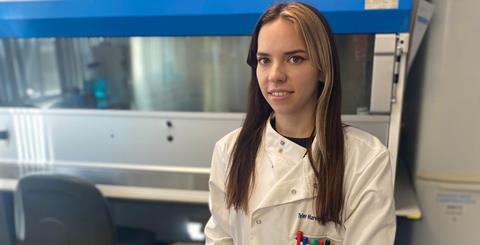Tyler carries out experiments linked to covid research and long-term lung diseases
Hello, I’m Tyler and I work as a laboratory technician at the University of Nottingham in the School of Life Sciences.

What does a university laboratory technician apprentice do?
I work in the research labs, supporting the PhD and the master’s students. I’m either directly doing the experiments or supporting and managing the labs for other people to run their experiments. I do a lot of grant funded research work, which has recently been linked to covid-19.I work in an Immunology lab focusing mainly on three areas chronic obstructive pulmonary disease (COPD), Covid-19 and allergies.
What is your typical day like?
The great thing is there is no typical working day. Some days I’m doing experiments, some days I’m completing health and safety forms or audits. I could be ordering supplies or supporting students. Sometimes I’m going to conferences, training events or external boards. It changes every single day.
I’ve done some experiments recently on covid antibody responses and I’m about to move onto the body’s immune response to e-cigarettes.
What do you like most about your job?
I love the science. I love finding things out, figuring things out and I feel very proud that that’s my job. I work in a great team which means I just enjoy being with them in the lab and when experiments don’t work or mistakes happen we can support one another.
I also like the flexibility of working in academia as I am a working mum. I know that I can come to work a little bit later or a little bit earlier. As long as I do my hours it’s flexible and I can plan experiments around whenever my son might have an after school club or a swimming lesson.
How did you get into your job?
When I was 18, I was applying to go to university to do midwifery and then I found that I was pregnant which led me to change direction. I still wanted to do something related to health science and have a university education but now I needed money because I had a family to support.
An apprenticeship seemed a great way to get a degree and be paid and employed as well as have a career. I found it on the government apprenticeship website. There was a three-part application process which included a maths, english and coding test. The last part was a face-to-face interview.
When I started my apprenticeship, I had previously obtained AS levels and a BTEC in health and social care. I then undertook a level 3 BTEC in applied science as part of my Level 3 Laboratory technician apprenticeship and then I moved on to a level 5 laboratoy scientist apprenticeship which is underpinned by a FdSc in applied bioscience.
Salary range and qualifications required
- Minimum qualification for role: Level 3 qualification such as A levels or equivalent.
- Starting salary band: £18,709 to 21,814
How does your job affect the world around us?
On a small scale, my work helps all the students that I work with and the academics. On the larger scale, the research that we carry out is giving us a better understanding of covid and COPD which could help people live healthier lives.
What skills are needed for it?
There are a lot of lab-based skills but the most important skills are time management and being organised. It really helps to be driven because the more you want to find out some results, the quicker and better you will do your experiments.
What inspired you to work in chemistry?
I just loved science at school. I really enjoyed it and my parents just said do what you enjoy. I loved finding out about new things, I loved the mental challenge that it gives you. I enjoyed that when you do an experiment and you get the results of that experiment, for that moment, you are the only person who knows the result of that experiment.
What advice would you have for a young person wishing to enter your career area?
Consider apprenticeships. They’re a great opportunity to work and study at the same time and have no student debt.
Say yes to opportunities when you’re earlier on in your career. Build your connections early on. At the beginning of my apprenticeship training, I moved around lots of different labs which helped me build connections and see how they all worked.
I think a lot of the big things I do now, like chairing a science apprenticeship forum and speaking at conferences, are due to the connections that I’ve made.
What do you see yourself doing in the future?
I’d like to still be working in academia and playing more of a role in apprenticeships in science, hopefully affecting policy in how apprenticeships in science are created and implemented.
Want to know more?
- Find out more about apprenticeships, Earn while you learn.
- Laboratory technician on the National Careers website.
- Search apprenticeships.
Tyler Harvey-Collishaw, laboratory technician apprentice, University of Nottingham.
First published October 2021













